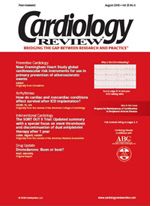Publication
Article
More stringent warnings of CV risk to accompany pain medications
Coronary Heart Disease
Orlando—The Food and Drug Administration (FDA) announced April 7 that all prescription nonsteroidal anti-inflammatory drugs (NSAIDs) remaining on the market must carry a black-box warning and a medication guide highlighting the increased risk of cardiovascular events associated with these agents. Medications subject to the requirements include the cyclo-oxygenase-2 (COX-2) inhibitor celecoxib (Celebrex), meloxicam (Mobic), and prescription-strength ibuprofen. Manufacturers of over-the-counter NSAIDs are being asked to develop more specific labeling with information on cardiovas-cular, gastrointestinal, and skin reaction risks.
The FDA also asked that the COX-2 inhibitor valdecoxib (Bextra) no longer be marketed owing to increased cardiovascular events and the risk of life-threatening skin reactions. Rofecoxib (Vioxx), another COX-2 agent, was withdrawn from the market in September 2004, also due to the increased risk of cardiovascular events. In a noncardiovascular trial, increased cardiovascular risk appeared after patients had been taking rofecoxib for 18 months.
“We knew 4 years ago that there was an increased risk of myocardial infarction [MI] and stroke with these [COX-2] medications, but no trials had been done in patients with cardiovascular disease,” said Eric Topol, MD, The Cleveland Clinic Foundation, during the recent American College of Cardiology Annual Scientific Session. “Furthermore, the moment these drugs were approved, they were direct-to-consumer marketed.”
CABG study shows lingering risk. While rofecoxib was associated with increased cardiovascular risk after long-term use, the first study of a COX-2 inhibitor in patients with coronary heart disease showed that risk increases within a few days of administration. “Even after the drug therapy stopped, while patients were taking aspirin, they were incurring significant cardiovascular and thromboembolic events,” Dr. Topol said.
Results of the Safety of Parecoxib and Valdecoxib in the Treatment of Postoperative Pain Following Coronary Artery Bypass Graft (CABG) Surgery or Major General Surgery trial were presented by Andrew Whelton, MD, Johns Hopkins University School of Medicine, Baltimore. Parecoxib is the water-soluble prodrug of valdecoxib, which converts entirely to valdecoxib after administration.
The study included 1,671 patients undergoing isolated CABG surgery who were randomly assigned to one of three treatment arms the first day postoperatively. The first group received a loading dose of 40 mg intravenous parecoxib followed by 20-mg doses every 12 hours for the first 3 days. This was followed by
7 days of treatment with 20 mg of oral valdecoxib every 12 hours. Patients in the
second arm received intravenous placebo for 3 days followed by 20 mg oral valdecoxib every 12 hours for 7 days; those in the third group received intravenous followed by oral placebo.
All patients received 75 to 325 mg of aspirin daily and pain management as needed with morphine or oral hydroxycodone and codeine. Patients were followed up for an average of 30 days after study medication was discontinued at day 10. Primary end points were cardiovascular thromboembolic events, renal dysfunction or failure, upper gastrointestinal ulcer complications, and surgical wound complications.
While the number of cardiovascular events was small, patients receiving both intravenous parecoxib and oral valdecoxib had a statistically significant increased event rate at 2% compared with placebo patients with a 0.5% event rate (P = .033). No significant difference was seen between those taking only oral valdecoxib and placebo. “The events occurred throughout the dosing and follow-up period,” Dr. Whelton said.
Dr. Whelton said that while these results show another link between increased cardiovascular events and a COX-2 inhibitor, particularly in coronary heart disease patients, there are no similar data evaluating NSAIDs in this population.
Questions remain. In contrast to the CABG surgery patients, no significant differences in cardiovascular thromboembolic events were observed in the general surgery patients without coronary heart disease taking the parecoxib/valdecoxib combination, reported Dr. Whelton.
Furthermore, there was no decrease in upper gastrointestinal events between treatment groups in either the CABG or general surgery arms of the study. “The reason these drugs were to be useful was to suppress significant gastrointestinal complications and bleeding,” Dr. Topol said.
Also notable was a significant increase in sternal wound complications among patients in the CABG trial receiving either the parecoxib/valdecoxib combination (3.7%) or oral valdecoxib alone (5%) compared with placebo (2.9%). Increased wound complications were not seen in patients undergoing general surgery.
